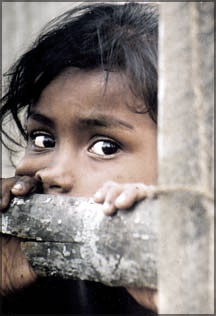Child prostitution is a problem. This we have heard many times. Measures have been taken to combat this problem with varying degrees of success. ‘Child prostitution’ has another meaning; children, or rather the terms ‘child’ and ‘children’ are frequently prostituted by all and sundry in political speech, policy document, articulation of vision, school reports, school essays, school debates etc. etc.
It is all about celebrating children, protecting children and how tomorrow belongs to children. Sometimes I feel it’s a whole lot of nonsense. Last week I got some data (yes, people still do research!). This was from the Justice Ministry.
Milinda Moragoda, the recently appointed Justice Minister and a man who can be trusted to shake out the dust accumulated over years of negligence, boredom and sheer incompetence and a refreshing readiness and humility to consult experts on subjects he is not familiar with, had got his officials to submit a comprehensive breakdown of cases pending before the courts. The data makes for several comments of course. My attention, however, was caught by a figure related to child abuse.
Out of 14,966 cases pending before the High Courts, 4032 (26.94 percent) were trials concerning child abuse. The region-wise breakdown indicates that parents, relevant authorities and indeed all citizens in certain areas should be greatly alarmed.
In Badulla 32.27 percent of pending cases were related to child abuse while the corresponding figure in Kegalle was 24 percent. Embilipitiya ‘scored’ a whopping 51.26 percent, i.e. more than half the cases that are awaiting final determination. Polonnaruwa (45.27 percent) Ratnapura (40.17 percent), Kandy (38.60 percent). Anuradhapura (33.16 percent), Gampaha (32.81 percent) and Kurunegala (32.66 percent) were the other ‘biggies’.
What do these numbers indicate? First of all, we must caution ourselves that these refer to only pending cases. So it is possible that the justice system finds it difficult to dispense of child abuse cases as quickly as it does other kinds of litigation. The implications are serious though. I don’t have a break-down of the average duration of a child abuse case.
The data set indicates that close to 20 percent of all pending cases before the High Courts are of offences committed before 1999 but there’s no category-wise break down. We can assume however that a significant number of cases are ‘old’ (‘significant’ to me would be equal to ‘one or more’). What does this mean for the abused child?
He/she is abused in the act and abused frequently thereafter. Finality, or ‘closure’ as it is popularly referred to, comes very late and this can only be traumatic for the victim. The true repercussions moreover can never be fully comprehended and there’s no way of telling what could result on account of this trauma.
I must add that this is a travesty that is suffered not only by victims of child abuse but all victims of sexual harassment and rape in whatever form (there is no ‘mild’ in these things).
We’ve heard it often, this thing about justice delayed being justice denied, but the issue of child abuse tells me that there are degrees of perniciousness wrought by delay. Every extra day that the victim has to wait until the Court issues determination is a repeated denial of justice. Quick closure is the only consolation for the victim and it is incumbent on the judicial system to correct whatever delay-making flaws there are to ensure that there is minimal ‘unwarranted punishment’ being meted out to him/her.
Another critical point to remember is that there is massive under-reporting when it comes to sexual abuse and especially child abuse given inherent vulnerabilities and the fact that a significantly high percentage of the perpetrators happen to be either close relatives or persons that are familiar to the victim.
Thus, on account of delay and on account of numbers, we really have a serious problem on our hands. The horror that chills our spines when we hear of a child being molested is therefore one that is milder than it really ought to be. We can’t watch over our children every minute of every day. And when it comes to a point that we can’t trust anyone, not even a close relative or a teacher we are really in perpetual distress. Foreboding becomes our constant companion.
I know of people who were abused as children but didn’t utter a word about it for years, suffering the fear, anxiety and even guilt in some cases silently and alone while life went on totally oblivious to all this. Psychologists, perhaps, will be able to elaborate on the damage to a child’s mind, the implications for his/her future and the impact on society in general. We can, as laymen, only surmise. It is still mind-boggling and that’s putting it mildly.
What should be done? Whose responsibility is it to do something about this? I believe that the judicial system should undergo serious reform when it comes to streamlining process and clearing backlog. I don’t know whose responsibility this is, but I am hopeful that Milinda Moragoda will do what is necessary in this regard. As for preventing child abuse, it is a matter that the Court system and the law-enforcement authorities cannot handle on their own.
To begin with, it is impossible to station a police officer inside every house. It is about awareness, then. It is about giving meaning to ‘may all being be happy’ and ‘love thy neighbour as thyself’. It is about being vigilant not only about one’s own child but all children because the person who abuses another’s child could very well abuse one’s own child at a later date.
I think it is time that the talking stopped. I am getting sick of ‘children are our future’. We are doing precious little to stop a significant number of children being traumatized, mentally, and therefore offering our silent consent to a crippled future. |

